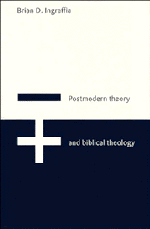Book contents
- Frontmatter
- Contents
- Acknowledgements
- List of abbreviations
- Note on translations of the Bible
- Introduction: postmodernism, ontotheology, and Christianity
- 1 NIETZSCHE'S MOCKERY: THE REJECTION OF TRANSCENDENCE
- II HEIDEGGER'S FORGETTING: THE SECULARIZATION OF BIBLICAL ANTHROPOLOGY
- 6 From the death of God to the forgetting of Being
- 7 Heidegger's theological origins: from biblical theology no to fundamental ontology
- 8 The redemptive–eschatological separation of flesh and Spirit in the epistles of the Apostle Paul
- 9 Inauthenticity and the flesh
- 10 The eigentlich Selbst or the pneumatikos anthropos
- III DERRIDA'S DENIALS: THE DECONSTRUCTION OF ONTOTHEOLOGY
- Conclusion: ontotheology, negative theology, and the theology of the cross
- Notes
- Bibliography
- Index
8 - The redemptive–eschatological separation of flesh and Spirit in the epistles of the Apostle Paul
Published online by Cambridge University Press: 01 June 2011
- Frontmatter
- Contents
- Acknowledgements
- List of abbreviations
- Note on translations of the Bible
- Introduction: postmodernism, ontotheology, and Christianity
- 1 NIETZSCHE'S MOCKERY: THE REJECTION OF TRANSCENDENCE
- II HEIDEGGER'S FORGETTING: THE SECULARIZATION OF BIBLICAL ANTHROPOLOGY
- 6 From the death of God to the forgetting of Being
- 7 Heidegger's theological origins: from biblical theology no to fundamental ontology
- 8 The redemptive–eschatological separation of flesh and Spirit in the epistles of the Apostle Paul
- 9 Inauthenticity and the flesh
- 10 The eigentlich Selbst or the pneumatikos anthropos
- III DERRIDA'S DENIALS: THE DECONSTRUCTION OF ONTOTHEOLOGY
- Conclusion: ontotheology, negative theology, and the theology of the cross
- Notes
- Bibliography
- Index
Summary
For the mind set on the flesh is death, but the mind set on the Spirit is life and peace, because the mind set on the flesh is hostile toward God; for it does not subject itself to the law of God, for it is not even able to do so; and those who are in the flesh cannot please God. However, you are not in the flesh but in the Spirit, if indeed the Spirit of God dwells in you … And if Christ is in you, though the body is dead because of sin, yet the spirit is alive because of righteousness. But if the Spirit of Him who raised Jesus from the dead dwells in you, He who raised Christ Jesus from the dead will also give life to your mortal bodies through His Spirit who indwells you.
Romans 8:6–11Nietzsche criticizes Christianity for denigrating the body and defining the essence of man through the fictitious concepts of the soul and spirit. Heidegger criticizes Nietzsche for remaining entrenched in the metaphysical conception of man as animal rationale, for merely reversing Platonism and Christianity to define the essence of man in terms of the body.
The overman is the expressly willed negation of the previous essence of man. Within metaphysics man is experienced as the rational animal (animal rationale). The “metaphysical” origin of this essential definition of man, a definition that sustains all Western history, has to this hour not been understood, has not been made a matter of decision for thinking. […]
- Type
- Chapter
- Information
- Postmodern Theory and Biblical TheologyVanquishing God's Shadow, pp. 123 - 137Publisher: Cambridge University PressPrint publication year: 1995



